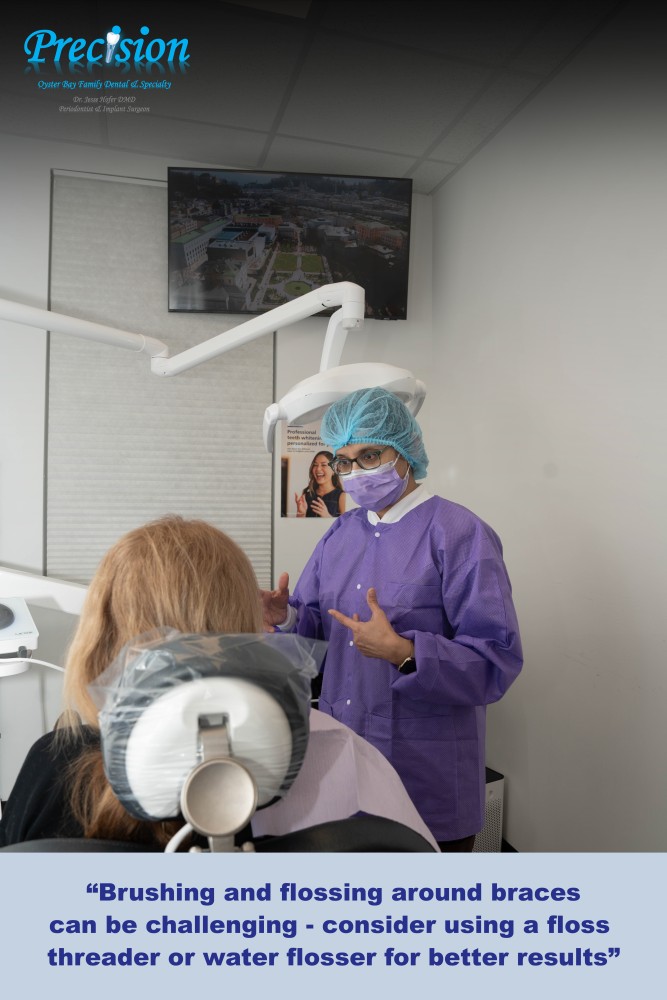8 Signs You Need Dental Implants
Written by Dr. Jesse Hofer, DMD November 7, 2024 22:48
Let’s be honest: having a full, confident smile makes a difference in every aspect of life. But if missing teeth, painful chewing, or constant discomfort are affecting your oral health, it might be time to consider dental implants.
Dental implants aren’t just cosmetic fixes; they’re a restorative choice designed to improve both function and appearance. So if you’re experiencing any of these issues, you may be closer to a solution than you think.
In this article, we’ll discuss when to get dental implants, eight telltale signs you need them, and offer insights on if they’re the right path for your unique situation.
If you want to take the first step toward reclaiming your smile, health, and confidence, check out our advanced dental implant solutions. You can also call us at (516) 916-6056 to find out more. Here at Precision Oyster Bay Family Dental we’d be delighted to assist you.
1. Missing One or More Teeth
Let’s start with the most obvious sign: you’re missing one or more teeth.
Tooth loss affects far more than just appearance. When you lose a tooth, surrounding teeth can shift, changing your bite and leading to problems like jaw pain or uneven wear on your remaining teeth. This misalignment can also impact your ability to chew efficiently, putting extra strain on your jaw.
Dental implants provide a permanent solution to these issues, functioning just like a natural tooth root to prevent teeth from moving, restore balance, and bring back your natural smile.
Further, gaps left by missing teeth can create ‘food traps’ where food particles and bacteria build up easily, leading to inflammation in your gums. This can increase your risk of gum disease and bone loss around adjacent teeth. By opting for implants, you can fill those gaps, keep your gums healthy, and enjoy the ease of your complete smile once again.
2. Severely Damaged or Broken Teeth
Sometimes, teeth are so damaged that regular fillings, crowns, or veneers just won’t cut it. Whether due to injury, decay, or general wear and tear, severely broken teeth can become painful and extremely challenging to maintain. These damaged teeth are also more susceptible to recurring infections or decay, which can eventually lead to tooth loss as well as affect surrounding tissues.
Dental implants offer a permanent, low-maintenance solution for damaged teeth that can’t be saved. Unlike removable dentures, implants are durable, resist decay, and provide stability, allowing you to bite, chew, and speak with comfort and peace of mind.
Also, it’s important to note that a damaged tooth can easily progress to infection if left untreated, impacting neighboring teeth and leading to further dental procedures down the line. By acting as a long-lasting fix, dental implants prevent this costly vicious cycle.

3. Loose or Ill-Fitting Dentures
Are your dentures sliding around or causing irritation? Loose dentures can make daily tasks like eating and speaking uncomfortable, leading many to feel self-conscious. Over time, the jawbone under dentures can weaken and deteriorate, further loosening the fit.
Dental implants anchor securely into the jawbone, providing a stable, natural-feeling solution that eliminates the need for adhesives or constant adjustments. Implants also offer the added benefit of stimulating the jawbone, which can slow down or even prevent bone loss—a common issue with traditional dentures. This stimulation helps to preserve your facial structure, so you can maintain a youthful, natural look for longer.
4. Shifting or Misaligned Teeth
Have you noticed any movement in your teeth or changes in their alignment? Shifting teeth can occur when there are gaps left by missing teeth or when dental structures weaken over time. This shifting not only affects your bite but can also contribute to a range of health issues, including jaw strain and even sleep problems.
For one, missing or misaligned teeth can sometimes impact airway stability, which may exacerbate conditions like sleep apnea (a condition where interrupted breathing can impact sleep quality and overall health). By filling these gaps and providing stability, dental implants help keep teeth aligned and maintain the natural structure of your mouth.
Can Dental Implants Help My Sleep Apnea?
Although dental implants aren’t a direct cure for sleep apnea, they can act as one powerful piece in an effective treatment plan, supporting the structure of oral appliances often used in sleep apnea treatment. Implants provide necessary stability in the jaw and can improve overall oral structure, which, in turn, allows oral appliances to fit more securely and work more effectively. In turn, this can help open airways.
If you’re dealing with sleep apnea, consult with your dentist to see if implants might benefit your oral health strategy.
5. Difficulty Chewing or Eating
Pain or difficulty while eating isn’t something to ignore. If you find yourself shying away from certain foods or chewing on one side of your mouth, it could be a sign that your teeth aren’t as functional as they should be. Missing teeth, damaged enamel, and weak dental bridges can all contribute to a compromised ability to chew.
Dental implants provide stability, allowing you to chew comfortably and evenly, so you can enjoy the foods you’ve been avoiding without pain or worry. Implants are designed to handle the pressure of chewing, just like natural teeth, so you don’t have to compromise your diet or your nutritional health.
6. Jawbone Deterioration
One lesser-known but critical sign you might need dental implants is jawbone deterioration. When a tooth is lost, the lack of stimulation in that area of the jaw can cause bone loss over time. This not only affects the structure of your face, leading to a sunken appearance, but it can also make future dental work more challenging (and costly).
Implants mimic natural tooth roots, stimulating the jawbone and helping to prevent further bone deterioration. By choosing implants early on, you can preserve your jaw’s strength and maintain the natural shape of your face. This bone preservation also makes it easier to retain a complete, balanced set of teeth as you age.

7. Persistent Tooth Pain
If you’re dealing with chronic tooth pain, it might indicate more deep-rooted issues such as extensive decay or nerve damage. In some cases, root canal therapy may be an option, but if the tooth is too damaged, dental implants offer a reliable alternative. Chronic pain can significantly reduce your quality of life, and relying on temporary fixes often isn’t enough.
Implants eliminate pain by removing the damaged tooth and replacing it with a fully functional alternative that looks and feels just like your natural teeth. They’re uniquely designed to integrate seamlessly with your jawbone, ensuring a secure fit that doesn’t rely on nor compromise nearby teeth. Plus, with an implant, you’ll no longer have to endure the daily pain or sensitivity that often comes with a severely damaged tooth.
8. Changes in Facial Structure
Believe it or not, missing teeth can subtly change the shape of your face. Loss of teeth and the resulting bone loss can lead to a sunken or “collapsed” appearance, where cheeks sink in and appear hollow and lips may seem thinner. These changes are often due to a lack of jawbone support, which shifts the balance of your facial features over time, and they affect not only appearance but can also contribute to challenges with speaking and chewing due to the shifting of remaining teeth and jaw alignment.
If you’ve noticed your facial structure shifting, it may be time to consider dental implants as a proactive solution. Implants help maintain the natural height and width of your jaw, preventing the sunken look associated with missing teeth. By preserving and restoring the integrity of your facial structure, implants can help you look younger and feel more confident in your appearance, effectively reversing some signs of aging and maintaining a fuller, healthier-looking face.
Final Thoughts: Ask Us About Dental Implants
Clearly, dental implants aren’t just about achieving a great smile—they’re about restoring function, promoting long-term oral health, and improving quality of life. If any of these signs resonate with you, it’s worth exploring implants as a solution. From filling gaps to maintaining jaw health, implants offer a reliable, durable option to tackle common dental challenges and improve your everyday life.
To address any dental emergencies like the ones we’ve discussed, be sure to contact us at Precision Family Dental for expert Oyster Bay services. Don’t let missing or damaged teeth hold you back—discover the benefits of dental implants for yourself and reclaim the confidence that comes with a complete, vibrant smile!